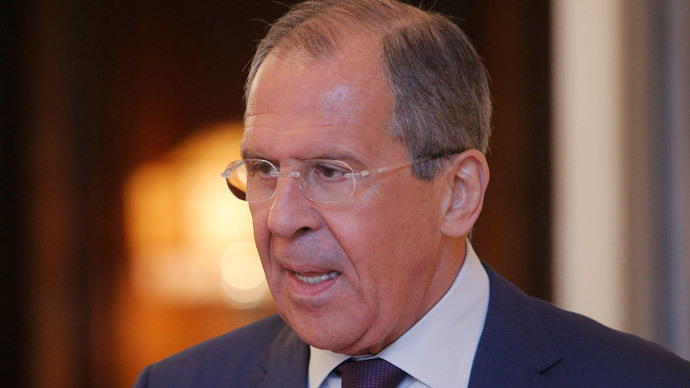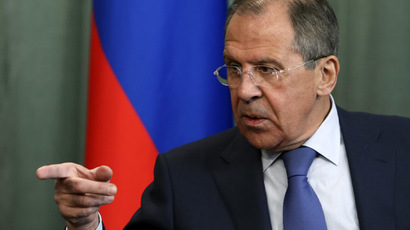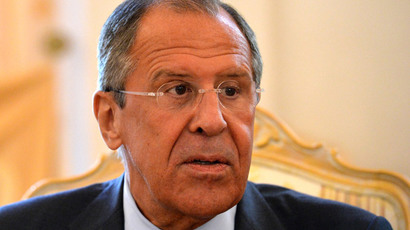West’s expansion to the east ruins historic chance at unification – Lavrov

The Ukrainian crisis is a natural result of the West’s expansion of its influence eastwards at the expense of Russian interests, Foreign Minister Sergey Lavrov said. This stance ruins a historic chance for a unified continent.
The turbulence in Ukraine is reminiscent of the violence and
bloodshed that Europe experienced in the 20th century, Lavrov
told a security conference in Moscow.
“The European continent, which brought two global military
catastrophes in the last century, is not demonstrating an example
to the world of peaceful development and broad cooperation,”
he said, adding that the situation wasn’t accidental, but rather
“a natural result of the developments over the past quarter
of a century.”
“Our Western partners rejected a truly historic chance to
build a greater Europe in favor of border lines and the habitual
logic of expanding the geopolitical space under their control to
the East,” Lavrov stressed. “This is de facto a
continuation of a policy of containing Russia in a softer
wrapping.”
The West ignored Russia’s calls for cooperation and would not
pursuit a challenge of bringing together different integration
projects in Eurasia. Instead it was forcing nations historically
close to Russia to choose between the East and the West.

“With Ukraine’s fragile political situation, this pressure was enough to trigger a massive crisis of statehood,” Lavrov pointed out.
But Ukraine is just one example of the destructive results that
Western foreign policies bring, Lavrov said.
“The operations to change regimes in sovereign states and the
foreign-orchestrated ‘color revolutions’ of different brands
produce obvious damage to the international stability. The
attempts to impose one’s own designs for internal reforms on
other peoples, which don’t take into account national
characteristics, to ‘export democracy’, impact destructively
international relations and multiplies the number of flashpoints
on the world map,” he continued.
“Schemes based on advocating one’s exceptionalism, the use of
double standards, pursuit of unilateral geopolitical outcomes in
crisis situation, are widely used not only in Europe, but also in
other regions,” the minister said. “This undermines
crisis mediation efforts.”
The problems in Ukraine, Syria, Afghanistan and many other
countries can only be solved through collective effort, and
Russia stands for joining forces in tackling issues. A collective
effort resulted in resent advances on the Iranian nuclear program
and launched the dismantling of the Syrian chemical arsenal,
Lavrov said. Meanwhile unilateral attempts to resolve the
Arab-Palestinian conflict proved to be deficient.

“When crisis management on all directions requires collective effort, one can hardly understand the reasoning of those, who take decisions on limiting cooperation with Russia over responding to common challenges and threats,” he said. “It’s doubtful that this would rise the efficiency of combating terrorism, preventing proliferation of weapons of mass destruction, responding to natural and man-made disasters or erecting barriers to extremism.”
Lavrov stressed that a polycentric system of global security, in which parties respect each other’s interests, cultural differences and the right to self-determination is needed to build a just, safe and democratic world.
The foreign minister was speaking at an international security conference in Moscow, which brought together some 30 officials, military officers and experts from more than 40 countries, including China, India, Pakistan, Egypt, Iran and Belarus. The Russian capital is hosting the event for the third time.
‘Color revolutions are like military operations’
Lavrov’s condemnation of color revolutions as an instrument of hostile international politics was mirrored by the Russian military at the conference. Defense Minister Sergey Shoigu said the Ukrainian crisis is the latest example of such a revolution, and it follows the global trend for them to become more violent.
“After the forced ouster of the president with the help of foreign forces, [Ukraine] has practically slid into a civil war,” he said. “A hotspot if tension has been artificially created in the heart of Europe. This has negatively affected global security.”
Shoigu added that the scheme for fanning an internal conflict used in Ukraine is applicable to many countries, and Venezuela, “where the legitimate government is being opposed by a so-called democratic opposition fuelled from abroad,” appears to be a victim of the same approach.
But unlike the color revolutions of the 1990s and 2000s, which were relatively bloodless, the latest generation of such operations increasingly resembles military invasions, the Russian minister stressed. Now color revolutions lead to long-term destabilization rather than the simple regime change that the forces triggering them initially aim at.

Meanwhile the head of Russian General Staff Valery Gerasimov accused the United States and its allies of initiating most of regional conflicts in recent history.
“The US cannot stomach the formation of new centers of power,” he stated. That’s why it uses a wide arsenal to ramp up regional tension, including unilateral sanctions, aid sent to West-allied forces, private military companies and ultimately the national military.
The general added that the Russian military will not leave without the new challenges that emerged amid the Ukrainian crisis.
“Some Western countries have ramped up anti-Russian rhetoric and are building up NATO troops in the Baltic, Poland and Romania, as well as military presence of the alliance in the Baltic Sea, the Mediterranean and the Black Sea,” Gerasimov said. “We cannot be indifferent to this and will have to take measures in response.”














